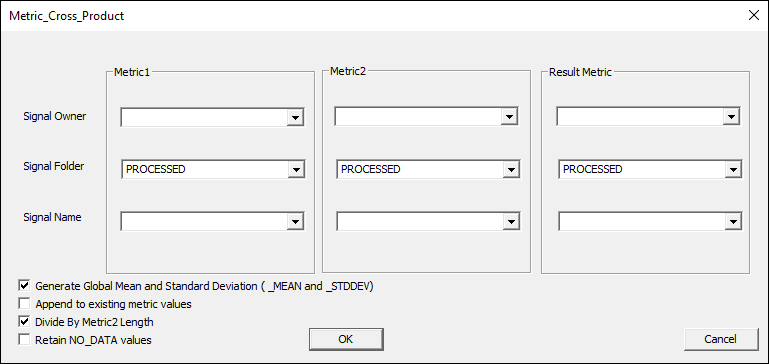This is an old revision of the document!
Table of Contents
Metric Cross Product
Overview
The Metric Cross Product command is used to create a cross product of two metric vectors. This could include finding the torque acting on a joint or other similar uses. The command can be found within the Pipeline Workshop in the Metric folder. The command acts on the active files.
Metric_Cross_Product /RESULT_METRIC_NAME= ! /RESULT_METRIC_FOLDER= ! /METRIC1_FILE= /METRIC1_NAME= ! /METRIC1_FOLDER= ! /METRIC2_FILE= /METRIC2_NAME= ! /METRIC2_FOLDER= ! /DIVIDE_BY_METRIC2_LENGTH= ! /GENERATE_MEAN_AND_STDDEV=(True or False)Generate the mean and standard deviation for all of the metrics created ! /APPEND_TO_EXISTING_VALUES=(True or False)Append this list of metrics to an existing metric of the same result name ! /GENERATE_VECTOR_LENGTH_METRIC=(True or False) ! /RETAIN_NO_DATA_VALUES=(True or False) ;
Command Parameters
The following table shows the command parameters seen above and their descriptions:
| RESULT_METRIC_NAME | The name of the result signal |
| RESULT_METRIC_FOLDER | The name of the result signal folder |
| METRIC1_FILE | The movement trial containing the first metric value |
| METRIC1_NAME | The name of the signal containing the first metric value |
| METRIC1_FOLDER | The name of the metric signal folder |
| DIVIDE_BY_METRIC2_LENGTH | (True or False) Divide the resulting signal by the length of the second metric |
| GENERATE_MEAN_AND_STDDEV | (True or False)Generate the mean and standard deviation for all of the metrics created |
| APPEND_TO_EXISTING_VALUES | (True or False)Append this list of metrics to an existing metric of the same result name |
| GENERATE_VECTOR_LENGTH_METRIC | (True or False)Generate metric value for vector length |
| RETAIN_NO_DATA_VALUES | (True or False) |
Dialog
The command can be edited in a text editor or in a dialog form. To edit in the dialog pop up form either click on the Edit button in the pipeline workshop or double-click on the pipeline command. The dialog is shown below.
The dialog box allows you to assign values to the command parameters outlined above.
Metric_File
If Metric1_File or Metric2_File are empty, Visual3D uses each active file when processing the command.
These parameters exist because the user may want to compute the dot product relative to a signal in the GLOBAL workspace or a specified file.
Divide_By_Metric2_Length
When this is true, a unit vector of Metric2 is used.
Append_to_Existing_Values
The results are concatenated to an existing signal.
Examples
Simple example
Showing functionality of the command, using a diagram possibly to show output.
Complex example
Combine with other commands and show step-by-step process for frequent use case

